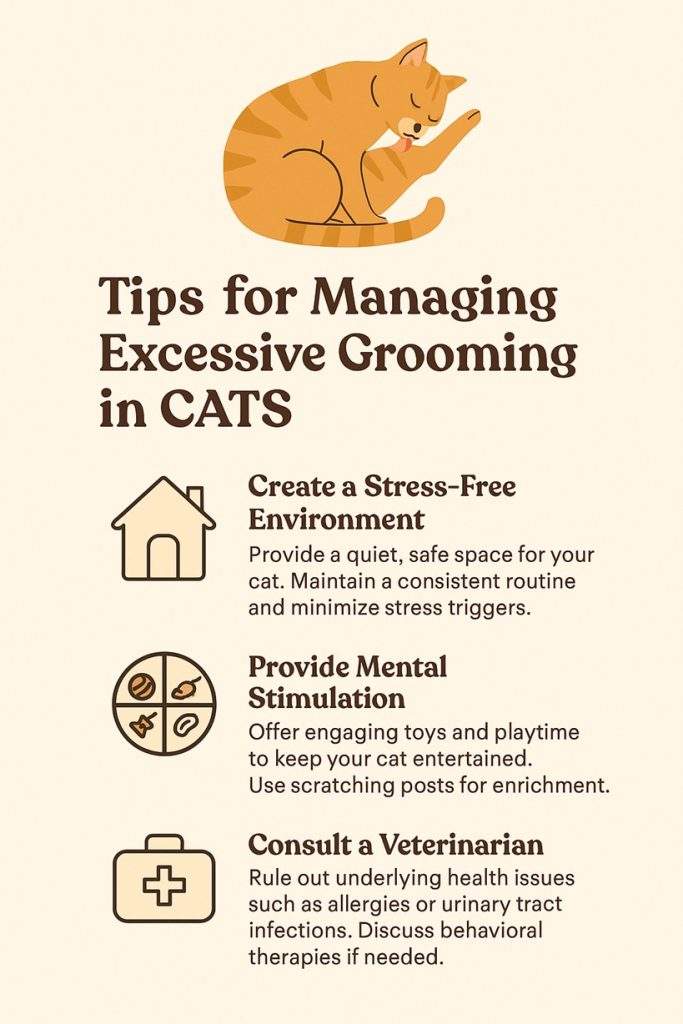(This articles is based on the information received over informal discussion with the veterinarian with over 10 years of experience)
Observing your male cat pull out and lick its penis can be a puzzling and sometimes concerning behavior. While often a normal aspect of feline self-grooming, it can also signal underlying medical conditions or behavioral issues that require veterinary attention. This article explores the common reasons behind this action and helps you identify when to seek professional help for your cat’s well-being.
Why Does My Cat Pull Out His Penis and Lick it?
-
Grooming behavior common in all cats – cats devote up to 30% of waking hours to self-grooming.
-
Libido peaks at 5–6 months of age, but erections persist after neutering.
-
Excessive genital licking may signal urinary tract infection (UTI) in 1–3% of cats annually.
-
Feline urethral obstruction (FUO) is an emergency when the penis cannot retract.
Your male cat pulling out his penis and licking it is quite common and it may be a common way to groom itself. However, it it gets excessive, it may be high time you can take the right action. The symptoms may typically go if you neuter a cat, but sometimes, the behaviour is also observed in neutered cats as well.

Some of the common reasons that you may witness an erect cat can include
Grooming
Taking out their penis and licking it may be a method to groom itself for your cat. Cats are highly flexible and groom all body parts; normal grooming occupies up to 30% of their waking time. Grooming is a very common feline practice. Cats are quite flexible and can reach almost every part off their body. Thye may pull out penis and lick it just to clean it properly.
It is quite common for all cats to groom themselves – whether neutered or not. Even female cats lick their genitals an clean it, but the sign becomes a little embarrassing with a male cat because it pulls out the penis and then licks it.
Libido or sex drive
This can be the primary reason for any male animal – including humans – to pull out their penis and handle it. Cats attain puberty at the age of 5 to 6 months. A very young cat may have more urgent and frequent sexual urges when compared to the senior cats.
If he feels there is a female cat in heat in its surroundings, he may have more libido than usual. It can make him get an erection and when there is no option to mate, he may simply pull out his penis and lick it. That can somewhat be compared to the act of masturbation in humans.
Normal, Non-Sexual Penis Protrusion
Have you seen your cat purring on your body, kneading you and then pulling out his penis? This is a common and a mechanical reaction. It happens automatically, and there is no reason behind it. In these cases, your cat does not take out his penis for any sexual purposes, but it is spontaneous reflex reaction of the body. If that’s the case with your cat, it is quite common and you need not worry.
Urinary tract infection
This can be a serious concern and may need you take your cat to a veterinarian. UTI is typically indicated by specific behaviour which includes taking out the penis quite often, finding it difficult to urinate, or even urinating outside the litter box. Your vet should be able to check your cat and offer any assistance which may include antibiotics.
Some common signs of urinary tract infection in cats would include
- Erections that do not indicate any sexual behavior or reflex reactions.
- Excessive licking of genitals
- Signs of pain in the stomach when peeing
- Urinating quite often in very less quantities
- Urinating outside the litter box
Feline Lower Urinary Tract Disease (FLUTD) & Urinary
Obstruction (FUO)
FLUTD as the overarching term for various conditions
affecting the bladder and urethra in cats.
It can include
-
Feline Idiopathic Cystitis (FIC): This is the most common cause of FLUTD, an
inflammatory bladder condition often triggered by stress, rather than a bacterial infection.
Symptoms include straining to urinate, frequent urination, small urine amounts, blood in urine, and inappropriate urination. Management focuses on stress reduction, environmental enrichment, and dietary changes. -
Urinary Tract Infections (UTIs): The bacterial UTIs are less common in young
cats but more prevalent in older cats or those with underlying health conditions like kidney disease or diabetes. -
Uroliths (Bladder Stones) & Urethral Plugs: Mineral formations (stones) or
plugs of inflammatory material, mucus, and crystals can cause irritation or lead to
blockages within the urinary tract. -
Feline Urethral Obstruction (FUO): This is a critical, life-threatening emergency,
especially in male cats due to their narrower urethra. Symptoms progress from initial FLUTD signs to complete obstruction, characterized by no urine production despite repeated attempts, crying, restlessness, hiding, lethargy, vomiting, and a painful, enlarged bladder. It is crucial to emphasize that straining without producing urine is a severe sign often mistaken for constipation. Risk factors include dry food diet, indoor lifestyle, stress, multi-cat households, and the male gender. Diagnosis typically involves cystocentesis (uncontaminated urine collection), urinalysis, and X-rays, while treatment focuses on unblocking the urethra.
Cat Penis Out – Any Serious Concern?
If you find your cat’s penis out for no practical reasons as outlined above, it may be due to a medical condition. The most common concern can be feline urethral obstruction (FUO). If you find your cat unable to retract its penis, it can lead to severe issues. The penis should not be left outside the shaft for prolonged period. That can lead to severe complications.
However, a male cat pushing out its penis when licking itself may be common. In these cases, the penis retracts back into position soon enough. However, continuous licking or cleaning of penis can indicate a possibility of soreness and uncomforrtability. A penis sticking out may also be a sign of a urinary tract infection or feline cystitis.
Can a Spayed Cat take Out his Penis?
Yes, just like normal ccats, neutered cats show the signs of erections. It can be a part of their grooming, or a sign that they are happy. However, neutered cats do not have the sexual thoughts and libido in their mind when they get erections. I have a female cat which is neutered, but she lifts her bum when petted. This is just a sign of happiness and not something sexual.
When a cat is neutered or spayed, his testiclees are removed. But, his penis continues to remain functional. Blood can pump into his penis, and this would mean he would get a physical erection. However, the frequency of an erection would be much less when you compare it to the non-neutered male cats.
Priapism & Paraphimosis: Medical Emergencies
Priapism and Paraphimosis are two severe medical emergencies in cats.
Priapism is a persistent erection lasting more than one hour without sexual stimulation. Paraphimosis, on the other hand, is the persistent extension of a non-erect penis from the sheath for over two hours, with an inability to retract it. Both these conditions can cause severe pain and comfort issues for your cat.
These conditions can cause tissue damaged that may often be irreparable. They can aso cause urethral obstruction. If you notice these symptoms, contact your immediately.
Signs
Associated signs include vocalization, excessive licking at the penis, and the penis appearing red, purple, dry, or swollen
Causes
Common causes include injury (e.g., during mating), certain drugs (e.g., phenothiazines), spinal cord or muscle injuries, foreign objects trapped around the penis, penile masses (cancer), penile infections, and, in some rare instances, castration.
Treatment
The possible treatment options include and range from conservative approaches (e.g., cold compresses, lubrication, anti-inflammatories) to surgical intervention, including penile amputation in severe cases.
Preputial Discharge
A small amount of yellow or white smegma from the prepuce is normal as part of the cat’s natural cleaning process.
However, an excessive amount or discoloration (e.g., blood, pus, or urine) can be dangerous and needs immediate medical attention.
Signs
An excessive licking, pain, swelling, and redness
of the prepuce, as well as general signs of infection or discomfort like straining to urinate,
fever, vocalization during urination, restlessness, lethargy, decreased appetite, and
decreased physical activity.
Causes
It can be a result of infections (bladder or kidney), bleeding disorders, prostate issues, inflammation, trapped foreign bodies, and cancer.
In kittens, littermate suckling on genitals, can lead to severe obstruction.
Treatment
Most common veterinary treatments include the use of an Elizabethan collar to prevent self-trauma, cleaning the area, administration of antibiotics, and, in some cases, neutering to diminish discharge.
Do Cats Self pleasure?
Pleasuring self in cats is quite common. It can result due to several reasons, even in altered cats. Non neutered cats indulge in this activity by by licking their penis, and in most of the cases, they would mount soft objets such as blankets to relieve their sexual tension.
Cats – especially those in the younger age – tend to get a huge libido. If they do not find a female ccat in their vicinity, they would attempt to pleasure themselves. The most common way to do this is to lick themselves or mount on any soft objects. If you notice any such behaviour in your cat, do not shoo them or punish them. It is just a normal behaviour and nothing wrong in it. Youur cat has every right for pleasuring itself.
Is It Normal for Cats to Lick Their Privates?
Yes, when it comes a normal behaviour for cats, it is absolutely fine for the cats to lick their privates. They lick their private parts to clean of dirt and debris. It may also be a means of self pleasure. If within limits, it should not be a cause for concern.
However, licking the privates without any obvious reason or appears to be quite excessive, it may be a cause for concern. It may indicate the issues such as UTI. However, it can also have a few other symptoms like crying when urinating or frequent attempts at urinating. They may also begin peeing everywhere. You may find your cat peeing outside litter box and
licking.
Tips for Managing Excessive Grooming
If your cat is obsessively licking his genital area or showing signs of over-grooming, it’s essential to address the behavior early. Excessive grooming can stem from physical discomfort, emotional stress, or even behavioral patterns developed over time. Here are several practical tips to help manage and reduce this behavior effectively.
Here are several practical tips to help manage and reduce this behavior effectively.
Provide a calm and stress-free environment for the cat
Even a few minor changes can affect your cat. It can be changing the furniture, arrival of a new pet or even change in your schedule.Here are a few ideas to create a calm environment and avoid the situations like cat penis stuck out.
-
Provide a quiet, safe retreat like a covered bed or cat tree.
-
Keep a consistent daily routine for feeding, play, and rest.
-
Avoid loud noises and chaotic spaces.
-
Consider using calming aids like Feliway diffusers or pheromone sprays, which mimic natural feline scents to soothe anxiety.
Provide a mental stimulation
Excessive grooming can be a sign of boredom. The cat will look to grooming as a self soothing behaviour. It can lead to a male cat licking private parts constantly.Here is how you can engage your cat –
-
Offer interactive toys (like feather wands, laser pointers, or treat puzzles).
-
Rotate toys weekly to maintain novelty.
-
Add climbing shelves, scratching posts, or window perches for natural exploration.
-
Schedule daily play sessions to burn energy and reduce idle behavior.
Consult a vet to address the possible concerns
If the over-grooming continues despite environmental and behavioral adjustments, it’s crucial to consult your veterinarian.The licking might be due to a medical issue such as:
-
Urinary tract infection (UTI)
-
Feline cystitis
-
Allergies or skin irritation
-
Hormonal imbalances
-
Neurological problems
When to Consult a Veterinarian?
| Symptom | Urgency Level | Potential Condition(s) |
|---|---|---|
| No urine passed despite straining | EMERGENCY (Immediate Vet Care) | Feline Urethral Obstruction (FUO) |
| Penis persistently extended (>1 hr, erect) | EMERGENCY (Immediate Vet Care) | Priapism |
| Penis persistently extended (>2 hrs, non-erect) | EMERGENCY (Immediate Vet Care) | Paraphimosis |
| Crying/Vocalization during urination | EMERGENCY (Immediate Vet Care) | FUO, FLUTD, UTI, Bladder Stones |
| Swollen, red, or discolored penis | EMERGENCY (Immediate Vet Care) | Priapism, Paraphimosis, Infection, Trauma |
| Lethargy, vomiting, loss of appetite | EMERGENCY (Immediate Vet Care) | FUO (toxin buildup), Severe Infection |
| Straining to urinate (small amounts, often) | Urgent (Vet within 24 hours) | FLUTD, UTI, Bladder Stones, FIC |
| Blood in urine | Urgent (Vet within 24 hours) | FLUTD, UTI, Bladder Stones, FIC, Preputial Discharge |
| Excessive, persistent licking | Consult Vet (If persistent/worsening) | UTI, FLUTD, Allergies, Dermatitis, Behavioral Overgrooming, Preputial Discharge |
| Discolored/excessive preputial discharge | Consult Vet (If persistent/worsening) | Preputial Discharge (Infection, Inflammation) |
| Litter box accidents | Consult Vet (If persistent/worsening) | FLUTD, UTI, FIC, Behavioral Issues |
| Scooting or rubbing rectal area | Consult Vet (If persistent/worsening) | Anal Gland Issues, Parasites, Dermatitis |
Well, licking penis can be a common behaviour for cats. However, there are some telltale signs that indicate the need for consulting a vet.
Persistent or Excessive Licking
If you find your cat pulling penis and licking it several times a day, and in a very obsessive manner, it could be a red flag. It can indicate issues like irritation, discomfort, or an underlying medical issue that’s causing your cat distress. It may not be routine grooming, if it combines grooming with other activities, you need not worry.
Signs of Discomfort or Pain
Watch for a few signs that might indicate that the cat is in deep pain. Cats are known to hide their discomfort. However, their posture or expressions can give a few signs that the cat is in pain.Look for a few signs like these –
-
Crying or yowling while in the litter box
-
Hunched posture or a tense belly
-
Sudden aggression when touched near the abdomen
-
Constant restlessness or hiding
Painful urination or inflammation in the urinary tract can cause your cat to associate the litter box with pain, leading to behavioral changes or avoidance.
Changes in Urination Patterns
This can be a critical sign that would require immediate attention.Check out these signs and seek immediate attention –
-
Straining to urinate or only producing a few drops
-
Urinating outside the litter box (especially in odd places like the bed or bathroom floor)
-
Frequent attempts to urinate with little success
-
Blood in the urine
-
Foul odor from the genitals
The Closing Thoughts
A cat pulling out his penis and licking it is never a concern unless it is marked by any specific other signs. One common illness that can result in excessive licking of genitals in cats is when it has a urinary tract infection. As long as you or your vet does not suspect of any such issue, you need not worry about your cat and its behaviour.Let your cat enjoy its normal life and give it the freedom that it deserves.
(Disclaimer – Please be aware that this content is created for educational and informational purposes only and should not be considered a substitute for professional veterinary care. If your cat is exhibiting symptoms of illness, pain, or unusual behavior, especially related to its urinary or reproductive health, it is crucial to consult with a qualified veterinarian immediately).




Add Comment